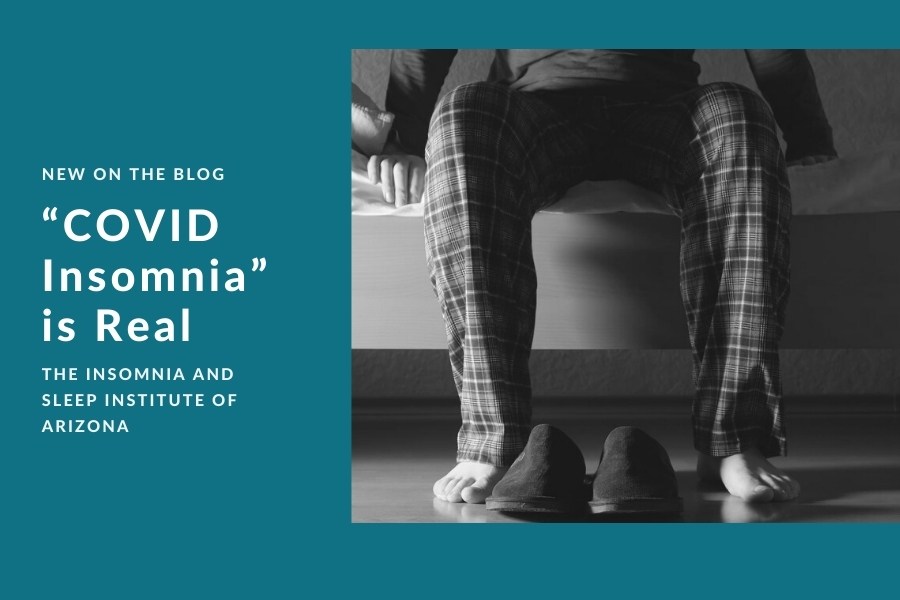Can viruses change how we sleep? According to Gemma Peach, Senior Lecturer at the University of Newcastle School of Medicine and Public Health, as well as other sleep experts, the answer is yes. At The Insomnia and Sleep Institute of Arizona, we saw a surge of “new” sleep disorder cases during the pandemic, a problem that persists today. Peach notes how there were many reports of sleep disruption at the start of the pandemic, particularly when stay at home orders, school closures, and lockdowns ensued. That is understandable, but what about now—when some semblance of “normal” is happening? Peach links the increase of COVID infections to a spike in poor sleep reports not necessarily being due to lockdowns but rather COVID infections.
The reports are as varied as the patients, though insomnia is very common. COVID patients, even those who have recovered, often talk about the struggle to fall and stay asleep (the classic insomnia complaint). Others discuss feeling fatigued in the daytime even when they think they got enough sleep, or just don’t feel like they can get enough sleep no matter what they do. In some cases, these common insomnia conditions are co-diagnosed as “long COVID” (bearing in mind that long COVID is obviously a relatively new diagnosis and can also vary widely in symptoms). Peach asks, “So, why is our sleep impacted by COVID infection, and why do the impacts differ so much between individuals?” It might come down to the relationship between sleep and immunity.
No Sleep for the Infected
Any time our body is infected with a virus, there is an inflammatory immune response. It’s how our body works to regain its health, but the process also requires our cells to produce cytokine proteins (they are what battle the infection). However, some cytokines are also in charge of promoting sleep, AKA “sleep regulatory substances.” When we have more cytokines (i.e. when we are fighting infections), we are sleepier. That’s why when we’re sick, we’re prone to sleeping the day away.
It sounds simplistic, but sleep and immunity have a bidirectional relationship. Poor sleep negatively affects immune function, just like immune function can impact sleep. When we sleep, particularly when it’s not REM sleep, cytokine production can spike. Our bodies are designed to sleep more when we are “sick” because it helps us to heal. So why isn’t this the case with COVID and long COVID?
A New Sleep Struggle
Since COVID is so relatively new, researchers are still learning about COVID and sleep. However, we have a long history of studying and understanding the relationship between sleep and other viruses. The common cold, or rhinovirus infections, has been linked to less sleep duration and lower cognitive performance in one study. Another study found that those with a respiratory infection slept more, spent more time in bed, and yet woke up more during sleep. Recent studies have shown that those with COVID have “more trouble sleeping” than those without COVID.
We know that viral infections like COVID can often change our sleep habits, but what is troublesome is that this can lead to long-lasting poor sleep habits. For instance, there are reports of those with COVID using electronic devices more so at night and right before bed. Poorer sleep can lead to daytime grogginess, which feeds the vicious cycle of having trouble sleeping at night. Peach suggests that these factors, either alone or in combination with one another, “may lead to the insomnia symptoms people with COVID are experiencing.” She stresses that in the short term, it’s not a huge deal, but chronic poor sleep habits can turn into chronic insomnia.
What to Do About COVID Insomnia
There are some diagnosed with long COVID who seem to be getting enough quality sleep but are still fatigued in the daytime. “More research is needed to determine why,” says Peach, but what you can do is start working with a sleep expert. She suggests this symptom might be linked to an excessive immune response, but COVID is so new that it will take time to determine the factors. In the interim, taking steps to increase sleep quality is paramount.
If you are having problems with sleep, regardless of COVID infection history, help is available. Contact The Insomnia and Sleep Institute today by calling the office, starting an online chat, or filling out the online form.





